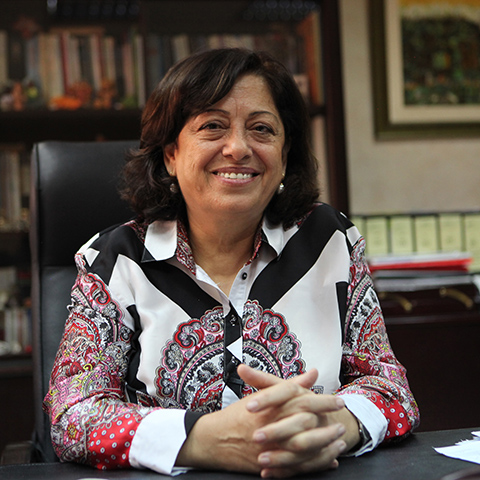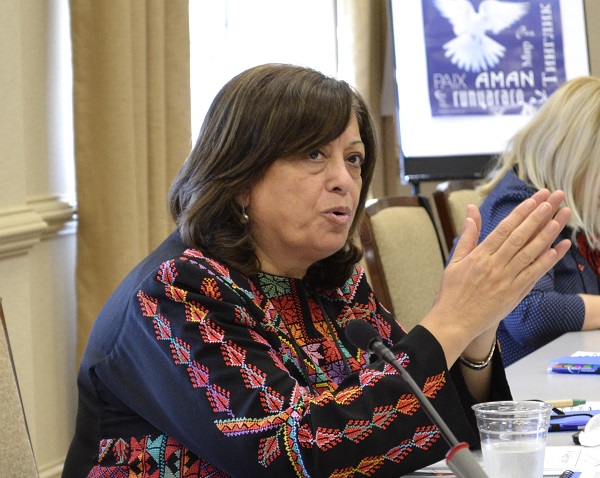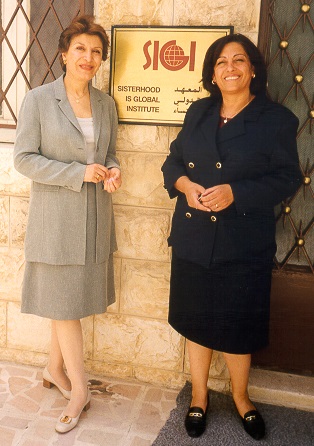
Asma Khader is a leading advocate for women’s human rights as well as founder and executive director of WLP’s partner in Jordan, Sisterhood is Global Institute-Jordan (SIGI-J). During her 40-year career as a lawyer and advocate, she has served as Spokesperson for Jordan’s Ministry of Culture & Government and as President of the Jordanian Women’s Union.
One of SIGI-J’s chief initiatives is to help implement United Nations Security Council Resolution 1325 (UNSCR 1325) in Jordan. UNSCR 1325 is a seminal resolution for gender equality as it recognizes the experiences of women during conflict and calls for increased participation of women at all levels of decision-making in peace and security processes.
The resolution, passed in 2000, states that “civilians, particularly women and children, account for the vast majority of those adversely affected by armed conflict, including as refugees and internally displaced persons.”
Following UNSCR 1325’s passage, Jordan began strategizing how to implement the resolution. Amidst deliberations, an enormous influx of refugees to Jordan subsequently complicated the viability of their strategy. Since the outset of the war in Syria, 655,000 Syrian refugees have settled in Jordan. Jordan also hosts refugees from Iraq, Palestine, Yemen, and Somalia, which brings its refugee population to an estimated 2.7 million people—the largest refugee population in the world, according to Amnesty International. In response, non-governmental organizations like WLP have worked to build the capacities of refugee women, and government authorities in Jordan overhauled the initial UNSCR 1325 action plan last year to take into account the refugee population.
UNSCR 1325’s mandates relate to its four pillars: participation, protection, prevention, and relief. In this comprehensive interview, SIGI-J Executive Director Asma Khader discusses these pillars as well as the challenges, strategies, and prospects of empowering local and refugee women in Jordan as dictated in the Resolution.

Why is UNSCR 1325 important in Jordan?
Khader: It is known that U.N. Resolution 1325 concerns our part of the world more than other regions, since women face exclusion and insecurity issues in a context of war, reconstruction and peace building in the countries that witnessed the so-called Arab Spring and those undergoing regime changes. But unfortunately, this resolution and other subsequent resolutions adopted by the U.N. Security Council did not receive enough attention, even though early efforts were made in Jordan in the framework of the Jordanian National Commission for Women.
How did the Jordanian National Commission for Women try to implement the resolution?
Khader: A committee was assigned including representatives of all interested parties, be it official authorities, the National Army, the General Security, Jordanian U.N. peacekeepers, or ministries like the Ministry of Foreign Affairs, Ministry of Interior, Ministry of Political Development, in addition to NGOs and experts such as chairmen of Mine Clearance agencies. This committee had regular meetings since 2007, and the idea was to introduce the resolution to all parties and to attend presentations given by each party, outlining the measures to be taken to implement the resolution from their ends, and to evaluate the current situation in Jordan. We discovered that Jordan has contributed female peacekeepers to the U.N. peacekeeping missions who have served in Darfur, Bosnia, and Haiti. We also found out that the Army adopted a policy to incorporate women, especially in municipal services like emergency response. In the same regard, we broadened the scope of study to examine and assess the political participation of women in Jordan. A regional conference was held and we carried out a number of workshops with participants from other Arab countries, and we concluded that we needed to develop a national action plan to implement Resolution 1325.
What happened to the first action plan?
Khader: A number of members were assigned to develop a strategy to follow up on the process of implementing Resolution 1325 in Jordan. Well, other measures had already been taken, but meanwhile, the refugee crises broke out, with the Iraqi refugees at first, and followed by the Syrian refugee crisis in 2011. Back then, the strategy had been finalized, but without much focus on the refugees’ issues, so we came to the conclusion that we needed to adjust the strategy and address the refugees’ issues, especially the females. So we agreed to revise the strategy with consideration of the current situation.
What role did you play?
Khader: At that time, I left the National Commission for Women and rejoined SIGI-J, which had already been contributing in the steering committee of civil society organizations, so we have been there since the beginning, and we still are. The National Commission worked to upgrade the plan. In the meantime, Iraq had already developed a plan, and another plan was issued by the League of Arab States.
When did the League of Arab States issue its plan?
Khader: I think it was in 2013.
Oh so it’s a recent plan then?
Khader: Yes it is. It was followed by the Iraqi plan. In Jordan, it was only in December of 2017 that the plan was approved by the council of ministers. Now that the plan has been approved, necessary resources should be provided and all parties should collaborate and carry out their assigned responsibilities. Regarding civil society, it should engage in capacity building and training, developing training manuals to enable the affected parties to comprehend the resolutions, its provisions, and the means of effectively implementing the resolution. Second, civil society should commit to reporting and monitoring the overall progress made by all stakeholders, as well as their interest and commitment to implementing the plan. Third, [civil society should] promote and raise awareness of this resolution’s values and provisions, in addition to all related resolutions. Therefore, involving journalists and academics in international human rights law and women’s issues is required. It is also important to develop training sessions at our two centers of studies on women.
,Founder, WLP Jordan/Solidarity is Global Institute/Jordan (SIGI/J)
Can you tell us about the training sessions?
Khader: We should work with female refugees in particular, and introduce these resolutions to them in simple and clear words, to encourage them to play a role in managing their local communities, to act as leaders in claiming certain rights, and also to participate in the reconstruction of their countries. Thus, they’re not just victims of wars and conflicts, but rather positive influences in alleviating the effects of conflicts and wars.
What measures will be taken to assure that the new Resolution 1325 implementation action plan makes progress?
Khader: Progress will be regularly assessed, and it is essential to join the international and regional assessments conducted by the Arab states to evaluate the progress in implementing these resolutions. For us, these resolutions are instruments of structuring efforts to reinforce the principles of security, peace, and equality for women, and fostering women’s participation to reduce the gender gap. All aspects of security and peace should be considered, [and] all levels within the family [because] in peace, as in war times, security is the first step for women and girls to achieve their full potential, and to participate in all aspects of life.

You said that the plan was endorsed by the government. Should it be approved by the parliament afterwards?
Khader: No, this is a plan and not a bill.
Is it effective then?
Khader: Absolutely, the plan is now effective. Now there’s a concrete project funded by Norway and Finland, in collaboration with the Jordanian National Commission for Women and with the participation of civil society organizations. The project is ready for kick off, but it was put on hold until the government budgets for it, as agreed. The government has to broaden this plan and reach all relevant parties, ministries, and institutions with a role to play.
Civil society should ensure the distribution of responsibilities among NGOs, and they should be assigned to specific regions to make sure that no governate or region is excluded or marginalized. Some of them will work on the academic level, others on the popular level; others will address lawyers and journalists. We [SIGI-J] are involved with female refugees, mainly.
With regards to what you just said, who is accountable, other than NGOs, on a national level?
Khader: The Jordanian National Commission on Women. The commission is the link between the government and the NGOs; it’s the intermediary, and the commission is the body that instigated the plan. Once endorsed, like with the National Strategy for Women, it is sent back to the Commission, but it also involves all the official bodies so it is not solely the responsibility of the National Commission. The National Commission for Women should adopt the plan, monitor its implementation, and guarantee the understanding of its pillars.

Regarding female refugees, is the government willing to address the crisis, or is it only civil society who is willing to?
Khader: The government did approve the plan drafted with the aim, among others, to work with female refugees, given that these refugees are also partners in building the future of their countries. After all, the best solution for a refugee is to return home, and once repatriated, they should be prepared to be leaders and to take initiatives, and they should be well advised on the matter. We must simplify the resolution and its obligations as much as possible for these women to boost their involvement and empower them to take action. Using formal language in introducing this UNSCR will drive female refugees away, especially those coming from underprivileged areas, who are more vulnerable and less educated than others.
When we talk about female refugees, are we talking about Syrians exclusively?
Khader: In Jordan, there are female refugees from different nationalities; there are camps of Palestinian refugees, most of them have already been naturalized, and nonetheless, they remain refugees. There are refugees from Iraq who are still in Jordan in great numbers. There are also female refugees from Libya, Sudan, and a number of other countries, but clearly in lesser numbers. The largest and the most impacted population of female refugees in Jordan are Syrian.
I would like to ask you about Iraq-- do you know how far they got with the implementation of the plan? Do you have an idea?
Khader: Well, everybody complains that plans are hindered by corruption, budget issues, and lack of rigor. We have concerns, so therefore we urge civil society to fulfill their duty of monitoring and following up, otherwise the plan will not reach beyond the shelves of official authorities. Several strategies are being adopted, but we tend to lack rigor in meeting the requirements. Besides, the key to implementing a strategy is nationalization, meaning that the whole concept should be fully assimilated by citizens. They must know what it is about, how it would affect their lives, and how they would benefit from it. It takes a lot to build capacities, raise awareness, clarify concepts, and link individuals’ daily lives to the common objectives of female citizens and refugees within the framework of the resolution. It is essential to massively familiarize people with the topic, theoretically and practically, in order to have them adapt the resolution’s clauses and content into their daily routines.
,Founder, WLP Jordan/Solidarity is Global Institute/Jordan (SIGI/J)
If we were to draw a conclusion about the role of local bodies like NGOs and CSOs, what should we learn in terms of advocacy and lobbying?
Khader: Three things: first, the involvement of all parties in the whole process, from preliminary discussions, representatives of official authorities, members of government, security and military officers, civil society, academics, and so on. This inclusive process of discussion forged a common belief.
Second, mutual visits with European countries like Finland, that have already developed a plan, an agenda, etc., and hosted a large delegation of the commission. The members got the opportunity to enquire about all the practical aspects, and noted the rigor and interest that paved the way to implement the plan, as well as its positive outcomes.
Third is lobbying through media coverage of the event and repeated interviews on the topic. In a way, Resolution 1325 became a key element in training on human rights, or international references on women’s rights. There was regular media and press coverage and countries were ranked in terms of their advancement in implementing the resolution, which was very embarrassing for the Arab countries, whose poor rankings reflect their poor interest in the subject. So, highlighting these facts through press releases, through general seminars, and through media made a significant difference.
This interview has been translated from Arabic, edited, and condensed.
Related Content
WLP supports calls from WLP partner Bir Duino-Kyrgyzstan to revise new restrictive NGO law
WLP strongly support our partner in Kyrgyzstan - Human Rights Movement: Bir Duino - in condemning the recently drafted law on “non-commercial non-governmental organizations” in Kyrgyzstan.
WLP Celebrates Earth Day: Women's organizations work for climate justice around the world
WLP's alliance of women's organizations leads local climate projects that address environmental degradation, economic inequality, and gender discrimination. This Earth Day, we are highlighting the climate action by women across our global partnership, from the international to the grassroots level.